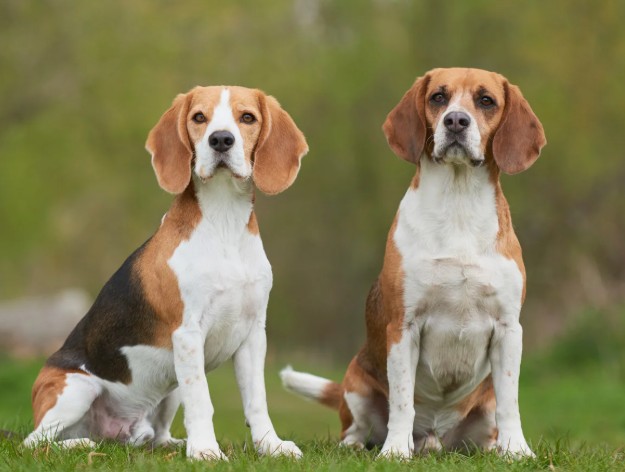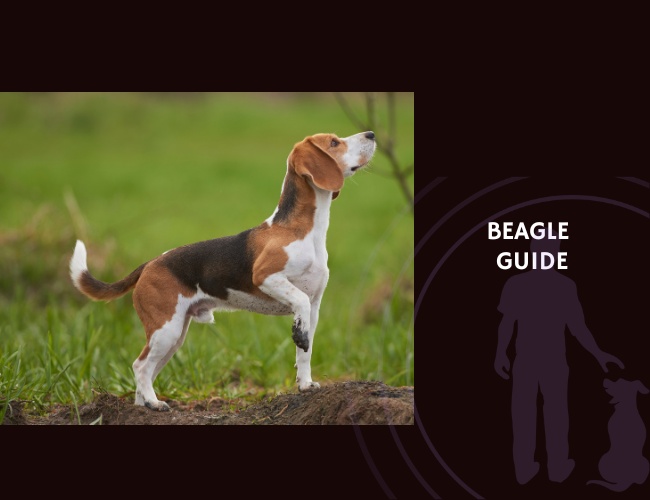Introduction to the Beagle Breed
A Nose for History
The Beagle’s roots run deep as scent hounds, originally bred for tracking rabbits and other small game. Their compact size, strong stamina, and legendary sense of smell made them favorites among hunters. These traits, honed over generations, still shine in modern Beagles. They boast a keen olfactory sense that guides much of their behavior and daily interests.
Modern Appeal as Family Companions
While their origins are in the field, Beagles have captured hearts off the hunt as well. Their gentle temperament, playful spirit, and loving nature make them one of the most popular dog breeds for families. Beagles usually get along well with children and other pets, making them a top choice for active households. However, their love for adventure and tendency to follow their nose mean that secure environments are a must.
What This Guide Offers
This guide is designed to be an informative, professional, and supportive resource for anyone considering life with a Beagle. Inside, you’ll find clear advice on their unique personality, behavior challenges, optimal training techniques, diet, health, and daily care. Whether you’re a potential owner or a long-time Beagle fan, this guide will help you understand what it takes to keep your four-legged tracker happy and healthy.
Understanding where Beagles come from sets the stage for recognizing their special traits and the joys—plus a few quirks—they bring to any household.
Character and Behavior Traits
Exceptional Sense of Smell and Olfactory Drive
Beagles are famous for their outstanding sense of smell. This ability is deeply rooted in their history as scent hounds, bred to track small game over long distances. Their noses are incredibly powerful—often “leading” them when outdoors. Because of this, you might notice your Beagle becoming almost completely absorbed in tracking an interesting scent, sometimes ignoring calls or other distractions. This focused olfactory drive is one of the reasons Beagles excel in scent work activities and detection games.
Social Nature with Humans and Other Dogs
Beagles are naturally social creatures. Their background as pack hunters means they tend to mix well with other dogs and generally enjoy spending time with people. Most Beagles are friendly, playful, and tolerant, making them a good choice for families or multi-dog households. They thrive on interaction and form strong bonds, preferring not to be left alone for long periods. Their supportive and engaging personalities add to their lasting popularity as companions.
Independent Personality and Exploratory Instincts
While Beagles are sociable, they’re also known for being quite independent. This means they can be less eager to please than some other breeds, sometimes making training a test of patience and consistency. Their curiosity drives them to explore, and they may follow their noses wherever an interesting scent leads. This exploratory behavior calls for secure environments and attentive supervision to keep them safe.
By understanding these key character traits, you’ll be better prepared to provide a supportive and stimulating environment for your Beagle, helping them become a well-rounded family member.
Common Behavioral Challenges
Vocalization and Baying
One of the most recognizable traits of Beagles is their vocal expression. Beagles are not just barkers; they also have a distinct bay, a deep, echoing call that traces back to their roots as scent hounds. While this baying helped hunters locate them in the field, at home it can surprise or even challenge their families. These vocalizations often arise from excitement, boredom, or the desire to alert. Consistent routines and mental stimulation help reduce unwanted noise. Still, be prepared for a dog who likes to “talk”!
Digging, Food Scavenging, and Wandering
Digging and scavenging behaviors are also quite common in Beagles. Their nose leads the way, so they often dig in search of hidden scents or wander to track interesting smells. This means gardens can face some creative Beagle landscaping and counters may need extra supervision. Always ensure food is stored securely and outdoor areas are well-fenced, as their exploratory instincts may inspire escape attempts.
Selective Responsiveness
The Beagle’s powerful sense of smell comes with a downside: selective listening. When a Beagle catches a captivating scent, commands can be ignored in favor of following their nose. This isn’t defiance; it’s instinct. Patience and a supportive, informative approach to training, using food or scent-based rewards, can improve response reliability.
Understanding these common challenges is the first step to building a harmonious relationship with your Beagle—one rooted in trust, respect, and practical management.
Effective Training Approaches
Positive Reinforcement: Food Rewards & Olfactory Motivation
Training a Beagle is most effective with positive reinforcement, especially using food rewards. These scent hounds are highly motivated by tasty treats, so offering small, high-value snacks as a reward for good behavior turns learning into a fun experience. Try using their favorite treat to reinforce commands like “sit” or “come”—quick rewards help Beagles stay engaged and interested. Scent-based enrichment activities, like hide-and-seek with food, can tap into their natural instincts and make training especially rewarding.
Patience and Consistency: Keys for Independent Thinkers
Beagles are intelligent but can be stubborn and independent. To set them up for success, training must be consistent and patient. Stick to short, regular sessions rather than long lessons that could lead to boredom. Repeat commands clearly, reward promptly, and avoid punishment—gentle persistence helps your Beagle learn over time. Since they often get swept up in scents, minimizing distractions during training is helpful for keeping their focus.
Leveraging Pack Mentality for Cooperative Training
Beagles have a long history as pack dogs, and they thrive on social cooperation. Training alongside other dogs or within group classes can boost their motivation. Incorporating social games, cooperative activities, or even family participation takes advantage of their pack orientation and encourages positive behaviors. When Beagles feel part of a group effort, they are more likely to engage and retain what they learn.
With these professional, supportive training strategies, Beagle owners can nurture a responsive, well-adjusted companion—setting the stage for a healthy and happy relationship.
Essential Training Focus Areas
Early Socialization
Socialization is crucial for Beagles from a young age. Introducing your puppy to new people, other dogs, and a range of different environments helps them grow into well-rounded adults. Early experiences can set the tone for positive interactions later in life. Puppy playdates, gentle introductions during walks, and supervised meetings with calm animals are all great ways to foster social skills. Consistent exposure helps prevent fearfulness and builds confidence.
Leash Training and Recall
Leash training is a must for this breed. Beagles are naturally curious and likely to follow their nose wherever it leads. Start with short, positive sessions, using treats to encourage loose-leash walking. Patience is key—avoid jerking or harsh corrections as Beagles respond better to positive reinforcement.
Recall training is equally important. Due to their strong scent drive, Beagles may ignore calls if they are fixated on a smell. Practice recall in distraction-free areas first, awarding your Beagle with a favorite treat or toy each time they respond to their name. Gradually introduce distractions to build reliability.
Incorporating Scent Work
Tapping into a Beagle’s strong sense of smell keeps their mind busy and less prone to mischief. Scent games, like hiding treats around the yard or simple nose work activities, can make training sessions enjoyable and mentally stimulating. These activities channel your Beagle’s instincts productively and help prevent boredom-related behaviors.
By focusing on socialization, proper leash habits, and engaging scent work, you set the foundation for a well-adjusted, happy companion.

Nutritional Needs and Diet Management
Portion Control for Food-Motivated Beagles
Beagles are famous for their hearty appetites and high food motivation. It’s not unusual to find them sniffing around for snacks at any opportunity. Because of this, portion control is vital to avoid unwanted weight gain and obesity-related health problems. Consistent meal times, measured servings, and limiting treats will help keep your Beagle at a healthy weight. Regularly checking your dog’s body condition and weight ensures you catch changes early and can adjust food amounts if needed.
Protein Balance for Lean Muscle
A balanced diet rich in quality protein is key for Beagles. Protein supports the development and maintenance of lean muscle mass, which helps active Beagles stay fit and satisfied after meals. Look for recipes featuring real meat, fish, or poultry as the main ingredient. Protein also helps maintain satiety, reducing your dog’s urge to overeat or beg for additional snacks.
Slow Feeding Techniques to Prevent Gulping
Beagles can be speedy eaters—which sometimes leads to gulping, choking, or even digestive discomfort. To slow things down, consider using slow-feed bowls or puzzle feeders. This approach not only encourages slower eating but also provides valuable mental enrichment, making mealtime both satisfying and safe. Slow feeding helps prevent bloating and can turn breakfast or dinner into a fun, stimulating routine for your pup.
Staying mindful of your Beagle’s diet will keep them healthy and energetic as you move forward with supporting their well-being in other areas.
Dental Health Considerations
Understanding Beagles’ Dental Risks
Beagles are especially prone to oral problems. Two of the most common issues are gingival (gum) disease and tartar buildup. Their love for food, combined with a tendency for plaque to stick to their teeth, creates the right environment for dental woes. If ignored, gingival disease can lead to pain, tooth loss, and even impact organs like the heart and kidneys.
Building a Dental Care Routine
Establishing a daily dental care habit for your Beagle is highly informative and supportive to their well-being. Owners should brush their Beagle’s teeth at least several times a week using a dog-friendly toothbrush and toothpaste. This helps remove food particles and slow down tartar formation.
Professional cleanings with your veterinarian are recommended once a year or as advised based on your dog’s needs. These deep cleanings address stubborn plaque and let your vet catch dental problems early on.
Dental Chews: A Tasty Solution
Dental chews offer another layer of protection. Chewing these treats helps mechanically remove tartar. Many dogs enjoy the routine, which makes oral care feel like a treat rather than a chore. Just ensure the products you choose are made for dogs and aim for those approved by veterinary dental groups.
Starting dental care early sets the stage for lifelong oral health. Consistency in this routine supports your Beagle’s happiness and overall vitality, so they stay energetic and engaged with the world around them.
Common Health Issues and Predispositions
Recognizing Inherited Health Risks
Beagles are generally robust, but some medical issues occur more often in this breed. Hypothyroidism is common; dogs may appear sluggish, have a dull coat, or gain weight for no apparent reason. This condition requires lifelong medication after diagnosis. Epilepsy is another inherited concern, presenting as periodic seizures that can vary in frequency and severity. While it often shows up in young adult Beagles, medication can help manage the disorder’s impact on daily life. Intervertebral disc disease (IVDD) affects the spine and can cause pain or difficulty walking, especially as your Beagle ages. Keeping your dog’s weight healthy can reduce stress on their back and joints.
Obesity and Weight Challenges
Beagles are famous for their love of food, but this can lead to obesity if portions aren’t managed. Overweight Beagles face increased risks for arthritis, heart issues, and diabetes. To keep your Beagle at a healthy weight, measure food carefully, limit treats, and make daily walks a must. Routine weight checks at the vet help catch changes early and avoid complications associated with extra pounds.
Ear Infections and Their Prevention
Beagles’ floppy ears look adorable but limit airflow, making them prone to ear infections. Their daily adventures often involve sniffing through grass and brush, raising the risk of trapped moisture or debris. Regular ear cleaning is key—use vet-approved cleaners and gently wipe the inner ear after outdoor play.
A proactive approach to health helps Beagles stay happy and comfortable as valued family members.
Track. Sniff. Wander.
A nose that leads.
Beagles follow scent trails the way artists follow vision. Their olfactory obsession isn’t a quirk—it’s a calling, centuries in the making.
Curious minds, loyal hearts.
They adore company, whether human or hound. But don’t mistake affection for obedience—Beagles are clever, independent, and often out on a mission.



Boundaries build trust.
Freedom without structure invites chaos. With secure spaces, patient training, and scent-fueled games, Beagles thrive—and keep coming home.
Preventive Healthcare
Regular Veterinary Checkups and Screenings
Preventive care for Beagles starts with regular veterinary visits. These checkups help spot early signs of common health issues like hypothyroidism, epilepsy, and intervertebral disc disease (IVDD). Annual or biannual screenings are advised, especially as Beagles age. Vets often recommend bloodwork to monitor thyroid function and musculoskeletal assessments. Catching problems early can make a significant difference in your Beagle’s quality of life and long-term health.
Vaccination and Parasite Prevention Schedules
Vaccinations are vital to protect Beagles from common canine diseases. Puppies need a series of vaccines starting as early as 6–8 weeks, with boosters continuing throughout their lives. Essential vaccinations commonly include distemper, parvovirus, adenovirus, and rabies. Parasite prevention is also important—monthly treatments can help safeguard against fleas, ticks, and heartworm, as well as internal parasites like roundworms and hookworms. Set reminders for these treatments to keep your Beagle healthy and comfortable.
Lifespan and Longevity Factors
Beagles typically enjoy a lifespan of 12–15 years with proper care. Maintaining a healthy weight, providing daily exercise, and prioritizing mental stimulation are key contributors to longevity. Proactive health management, such as portion control and regular screenings, further supports a happy, active life.
By focusing on preventive healthcare, you help your Beagle thrive well into their golden years, creating a foundation for an energetic and fulfilling life.
Exercise Requirements
Meeting Daily Activity Needs
Beagles are energetic dogs that thrive when given ample daily exercise and opportunities for exploration. As scent hounds, they have high stamina and truly enjoy active routines. Aim for at least 1 hour of physical activity each day. This can include brisk walks, safe off-leash play in a fenced area, or games of fetch. Routine outings keep them healthy and help prevent the boredom that could lead to undesirable behaviors like digging or baying.
Incorporating Mental Stimulation
Physical exercise is not enough for Beagles—their sharp minds crave engagement, too! Regular scent work, such as hide-and-seek with treats or tracking games, taps into their natural instincts and keeps them alert. Puzzle toys, food-dispensing balls, and interactive games make exercise more rewarding and mentally challenging, helping your Beagle stay curious and content.
Safe and Supportive Exercise Options
Because Beagles often follow their noses, always use a leash during walks in unfenced areas. Their tendency to wander in pursuit of interesting scents makes secure fencing a must at home. Choose routes or play spaces that allow for plenty of sniffing time, as this greatly enriches their experience. Avoid over-exercise, especially for puppies and older dogs, to protect their joints and overall mobility.
Structured, purposeful exercise—blending movement and mental tasks—will help your Beagle remain physically fit and emotionally balanced. This approach supports their well-being and sets the stage for creating an environment that keeps them both safe and happy.

Creating a Beagle-Friendly Environment
Securing Spaces to Prevent Wandering
Beagles are curious and adventurous, making secure fences a necessity. Their strong sense of smell often leads them to track scents far from home. A sturdy fence at least 120cm tall is recommended, with no gaps or weak points where a Beagle could squeeze through or dig under. Always check outdoor areas for hazards and avoid leaving doors or gates unlocked. On walks, keep your Beagle leashed; their nose can easily pull them off course.
Opportunities for Mental Enrichment
Beagles thrive in environments that offer both mental and physical stimulation. Interactive toys such as puzzle feeders or hidden treat games tap into their olfactory talents, preventing boredom and destructive behaviors. Scent-based activities, like hide-and-seek with treats, provide a constructive outlet for their tracking instincts. Rotate enrichment toys regularly to keep your Beagle challenged and satisfied, reducing frustration and unwanted behaviors.
Managing Exploratory Instincts
To address their tendency to wander and explore, structured activities can redirect Beagle focus. Scheduled playtime, scent work sessions, and problem-solving games provide positive outlets that mimic natural behaviors. Consistency in daily routines also helps, offering predictability to reduce anxiety or escape attempts. In multi-dog households, cooperative play further satisfies their pack-oriented nature and social needs.
Meeting these environment and enrichment needs keeps Beagles physically safe, mentally happy, and less likely to seek adventure outside. This balanced approach sets the stage for a strong bond and a well-adjusted companion.
Social Needs and Family Integration
Thriving in Multi-Dog Households
Beagles are true pack dogs. Originating from generations of hunting in groups, they tend to shine in multi-dog households. Living with other friendly dogs gives them daily opportunities for play and social enrichment. This setup supports their need for companionship while reducing boredom or separation stress. If you’re considering a second pet, a Beagle will often adapt well and even help other dogs feel more secure.
Understanding Interaction Requirements
Consistent interaction is vital for Beagle happiness. They crave daily attention from their human family or dog friends. Regular play sessions and group walks not only fulfill their exercise needs but also reinforce social bonds. When left alone for long stretches, Beagles may develop undesirable behaviors like excessive barking or attempts to escape.
Practical tips for healthy interaction include:
- Scheduling daily playtime with humans or other pets
- Engaging in scent-based games that trigger their tracking instincts
- Practicing basic training together to build trust
Preventing Separation Issues
Beagles are prone to separation issues if their social needs go unmet. Ease transitions by leaving toys or food puzzles during alone time. For families with demanding schedules, doggy daycare or trusted pet sitters can be helpful solutions.
Routine, Predictability, and Emotional Well-Being
Routine is key for a well-adjusted Beagle. Set feeding, walking, and play schedules help reduce anxiety and create a sense of security. Predictable routines allow Beagles to anticipate activities, promoting calmness and cooperation. When their world feels stable, Beagles are much less likely to engage in destructive behaviors or vocalizations.
Fulfilling a Beagle’s social and emotional needs is a cornerstone of their overall well-being. Structured, supportive environments help Beagles flourish as cherished family members.
Behavioral Enrichment Strategies
Food-Based Puzzles and Enrichment Toys
Beagles love to use their noses and brains, so food-based puzzles are a fantastic way to keep them mentally sharp and satisfied. Puzzle feeders and treat-dispensing toys can turn mealtime into an engaging challenge. These tools slow down fast eaters and relieve boredom, helping prevent unwanted behaviors caused by under-stimulation. Rotating different toys keeps each activity fresh and interesting, reducing the risk of your Beagle losing interest.
Scent Work for Mental Stimulation
Tap into your Beagle’s natural instincts with scent work activities. Simple games like hiding treats around the house or yard encourage problem-solving and satisfy their strong tracking drive. Advanced options, such as organized nosework or tracking courses, provide structured mental workouts that many Beagles thoroughly enjoy. This targeted enrichment is especially important to channel their olfactory fixation in positive directions, supporting a balanced temperament.
Social Games Rooted in Pack Instincts
Since Beagles are pack dogs at heart, they often thrive on group play and interactive social games. Activities like tug-of-war, fetch with multiple family members, or hide-and-seek help build bonds and promote cooperation. In multi-dog households, supervised group games let Beagles develop social skills and learn impulse control through friendly competition.
Consistently providing diverse enrichment keeps your Beagle engaged, happy, and less likely to develop problem behaviors. Supportive, professional, and informative strategies for mental stimulation set the foundation for a well-adjusted companion.
Conclusion: Is a Beagle Right for You?
Assessing Your Compatibility
Choosing a Beagle means welcoming an energetic, curious, and food-motivated companion. These dogs have an independent streak, love scent-based play, and need consistent routines. Beagles generally fit best with families or individuals who can offer plenty of interaction, socialization, and daily exercise. If you value an active lifestyle and enjoy spending time outdoors, a Beagle may be a good companion. However, their love of exploring and sniffing may challenge those who prefer a low-maintenance or sedentary pet.
Key Considerations for New Owners
Before bringing a Beagle home, consider these important points:
- Daily exercise is a must—for their mind and body.
- Secure fencing prevents escapes, as their noses can lead them astray.
- Social time is vital: Beagles are happiest with company, whether from humans or other dogs.
- Consistent routines and positive reinforcement help manage their independent nature and keep them mentally balanced.
- Portion control is critical due to their high food motivation, helping avoid weight issues.
Ongoing Support and Resources
Caring for a Beagle is a long-term commitment, often up to fifteen years. Stay informed with regular veterinary visits, dental checkups, and nutritional reviews. Join Beagle owner groups online or in-person for tips, playdates, and support. Professional training can also be a great investment for first-time owners.
By understanding these core needs and making thoughtful lifestyle adjustments, you can create a happy, enriching environment for your Beagle.










